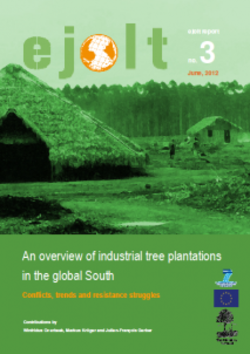Ejolt Report 3:
ENGLISH EJOLT Report 3 (Low resolution) for online viewing.
ENGLISH EJOLT Report 3 (High resolution) for printing.
SPANISH EJOLT Report 3 (Low resolution) for online viewing.
SPANISH EJOLT Report 3 (High resolution) for printing.
PORTUGUESE EJOLT Report 3 (Low resolution) for online viewing.
PORTUGUESE EJOLT Report 3 (High resolution) for printing.
Abstract
Over the past two decades, industrial tree plantations (ITPs), typically large-scale, intensively managed, even-age monoculture plantations, mostly exotic trees like fast-growing eucalyptus, pine and acacia species, but also rubber and oil palm, all destined for industrial processes to produce paper, palm oil and rubber products, increased their area in the global South about fourfold. Some of the main countries with millions of hectares include Brazil, Malaysia and Indonesia while ITPs are expanding in African countries, like Mozambique, and in the Mekong region in a context of increasing land grabbing. This expansion is Northern-driven; the US and the European Union together consume most of the final products, benefiting also their banks and businesses that are key players in the different industry sectors behind ITPs, and also increasingly investment funds.
In the global South where plantations are set up, local people, while having a very low consumption level, suffer severely from the negative impacts of these plantations. The social and environmental justice conflicts that result from the negative impacts of plantations are mainly about land access and tenure, but also other social, economic, environmental and cultural impacts. Human rights violations are common in many countries.
In spite of the heavy negative impacts of ITPs, they continue being actively promoted as carbon sinks, or to supply energy and electricity through biofuels and burning wood in specially designed and subsidized wood-based power facilities in Europe. These new trends only aggravate the negative impacts, while the proven deforestation and land use change that results from plantation expansion undermines the supposed carbon neutrality.
Although consumption reduction and paper recycling are important, a structural change in the global industrial production and consumption system, of which paper, vegetable oils and rubber are fundamental parts, is needed in order to build a truly sustainable future. Meanwhile, local communities in the South face the challenge to continue building a stronger and broader movement to halt the continuous land grabbing for industrial tree plantations.
Keywords: carbon trade, commodity chains, conflicts, ecologically unequal exchange, endosure of the commons, industrial tree plantations, land grabbing, resistance struggles, social and environmental justice, sustainable consumption
Authors: Winfridus Overbeek, Markus Kröger and Julien-François Gerber














